Call the Midwife: Season One Blu-ray Movie
HomeCall the Midwife: Season One Blu-ray Movie 
BBC | 2012 | 355 min | Not rated | Nov 06, 2012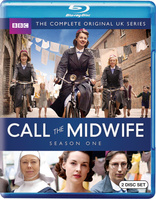
Movie rating
7.6 | / 10 |
Blu-ray rating
| Users | 0.0 | |
| Reviewer | 4.0 | |
| Overall | 4.0 |
Overview
Call the Midwife: Season One (2012)
Stories from the memoirs of a midwife and nurse who worked in the East End of London in the 1950s.
Starring: Jessica Raine, Pam Ferris, Helen George, Laura Main, Judy ParfittNarrator: Vanessa Redgrave
Director: Philippa Lowthorpe, Juliet May, China Moo-Young, Minkie Spiro, Jamie Payne
| Period | Uncertain |
| Drama | Uncertain |
Specifications
Video
Video codec: MPEG-4 AVC
Video resolution: 1080i
Aspect ratio: 1.78:1
Original aspect ratio: 1.78:1
Audio
English: LPCM 2.0
Subtitles
English SDH
Discs
50GB Blu-ray Disc
Two-disc set (2 BDs)
Packaging
Slipcover in original pressing
Playback
Region A, B (C untested)
Review
Rating summary
| Movie | 4.5 | |
| Video | 4.0 | |
| Audio | 3.5 | |
| Extras | 1.5 | |
| Overall | 4.0 |
Call the Midwife: Season One Blu-ray Movie Review
A Helping Hand for the Hand That Rocks the Cradle
Reviewed by Michael Reuben December 27, 2012Call the Midwife is a textbook example of how smart casting and sharp writing can transform an unlikely subject into addictive television. Pregnancy and birth (and their complications), especially in deprived circumstances, hardly sound like an occasion for entertainment, but this BBC series has made believers out of fans in both the U.K. and America. The series is a dramatization of a bestselling memoir of the same name by Jennifer Worth, who worked as a midwife and nurse in London's East End in the 1950s. Worth published her book in 2002, after reading an article in a professional journal urging a midwife to come forward and fill a gap in popular literature, because the midwife's role in public health had never been told. By this point, Worth had been retired from nursing for almost thirty years, having embarked on a second career as a successful musician. Writing became her third career. Call the Midwife was followed by two further volumes about Worth's experiences in midwifery, plus an additional book about her work with terminally ill patients. Worth consulted on the BBC adaptation of her stories, but died just two weeks before filming began. The East End in the 1950s was grim territory. The region had suffered such battering from the Nazi blitz that, after German bombs landed in a courtyard at Buckingham Palace, Queen Elizabeth, the current queen's mother, famously said: "I am glad we have been bombed. It makes me feel we can look the East End in the face." Reconstruction focused on more prosperous parts of London, leaving the East End in rubble for years after the war's end. Poverty and unemployment were high, and much of the housing was barely habitable. Although the National Health Service was established shortly after the war, it was still in its infancy, and doctors did not flock to poor neighborhoods. Residents had to seek health care from charitable organizations like the facility attached to an Anglican nunnery that Worth called "Nonnatus House" in her book. (In real life, it was the Sisters of St John the Divine.) There it was that a highly trained but otherwise naive young woman reported one morning for her first day of work.
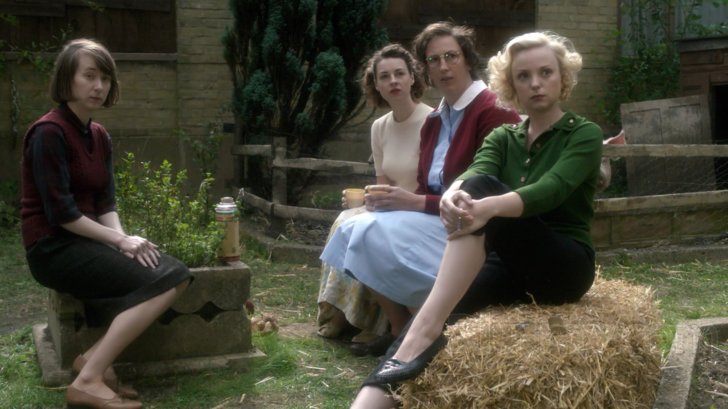
Each of the six episodes in Season One of Call the Midwife opens and closes with narration by the elder Jennifer Worth (speaking in the voice of Vanessa Redgrave) introducing characters and providing perspective. This retrospective device is essential to the series, a constant reminder that the young Jennifer we follow through the events of the series (Jessica Raine) survives her adventures with grace and dignity, as do most of the people she encounters. In a series that often ventures into dark subject matter, this narrative strategy is a critical counterbalance. The first episode opens in 1957 with the young Jenny Lee (Worth's maiden name) striding purposefully through the crowded streets of the East End's Poplar district, lugging her suitcase. As she approaches Nonnatus House, Jenny is halted by a crowd that has formed around two women, one of them pregnant, in a no-holds-barred fistfight over a man, presumably the child's father. After the cops break up the fight, a tough fireplug of a nun, Sister Evangelina (the wonderful Pam Ferris), steps out of the door and asks which of the two floozies, both worse for wear, is her patient. Jenny's welcome to the East End is the first of many eye-openers for this sheltered middle class girl. Both within the surrounding environs and inside the walls of Nonnatus House, she encounters one circumstance after another that introduce her to people she never knew existed, expand her experience of the world and deepen her appreciation of the courage required to affirm life in the face of hardship. First, though, she has to be outfitted with a midwife's medical kit and be assigned a bicycle, an essential mode of transport here, because the streets are narrow, twisting and frequently obstructed by debris, children playing, market traders and people from the neighborhood. Each hour-long episode is woven of several intertwining stories, at least one of which focuses on the residents of Nonnatus House. Jenny's fellow civilian midwives include Trixie Franklin (Helen George), whose Marilyn Monroe platinum blonde hair bespeaks a similarly flirtatious approach toward men; in her work, however, she is utterly serious. Cynthia Miller (Bryony Hannah) is Trixie's opposite number on the surface: plain, sober and serious. Underneath, though, they are both driven by the same odd mix of practicality and idealism that makes Cynthia request to be assigned to attend a dying patient and her spouse, because she thinks she can be of use. (She is.) The fourth member of the civilian quartet is the memorable Camilla Fortescue-Cholmondeley-Browne, or "Chummy" as she's called. In Worth's book, she was unusually tall, and she's played by Miranda Hart, who is 6' 1" and best known as a comic actress. Chummy is even more a fish out of water at Nonnatus House than Jenny Lee. Upper class, with a titled mother, she's had a privileged upbringing, but her size and awkwardness have caused her family to write off her marriage prospects. However, missionary work in Africa is considered respectable, and a stint as a midwife in the East End is solid preparation. Chummy's distinctive combination of sheltered past and gung-ho determination and her endearing clumsiness—her struggles to learn bike-riding are a key plot point—have made her a popular character. Hart's performance is a masterpiece of understatement in a role that could easily have been milked for comedy. On the religious side, we have the aforementioned Sister Evangelina, who fits neatly into the tradition of characters whose bark is worse than their bite. One of the season's high points is when she erupts with impatience over one of the civilian nurses and a gentleman admirer who have been shyly circling each other for days and literally forces them to make a date (in front of everyone at Nonnatus House). A similarly practical disposition is evident in Sister Julienne (Jenny Agutter), the head of the institution, but it is accompanied by a steely reserve that both intimidates and commands respect. Jenny Lee is repeatedly surprised, even shocked, however, to discover deep wells of compassion and understanding hidden behind Sister Julienne's formal exterior. The bespectacled Sister Bernadette (Laura Main) is young, obedient and well-behaved. Nonnatus House needs someone of that disposition to balance out its most colorful inhabitant, Sister Monica Joan (Judy Parfitt). Formerly a distinguished midwife and now retired, Sister Monica Joan hovers somewhere between a ward of Nonnatus House and its resident sage. No one can decide whether she suffers from dementia or has simply reached the point in life where she no longer cares about social norms. Whatever the reason, she says what she wants and disappears into her own world when called to account. She often functions in the story as a Greek chorus, but one that may be drunk. Not all the regular cast is female. The house has a male handyman named Fred (former EastEnders regular Cliff Parisi), who is always working on a moneymaking scheme. The local constable, PC Noakes (Ben Caplan), keeps a watchful eye on Nonnatus House. Jenny has a charming admirer from her former life named Jimmy (George Rainsford), who faithfully tracks her down and declares his admiration. (The state of Jenny's heart is one of the season's overarching mysteries.) And Dr. Turner (Stephen McGann), a general practitioner, appears for consulting hours when the clinic is thronged with expectant mothers, and he remains on permanent call for deliveries and emergencies. The fact that Dr. Turner is the sole physician available to this entire community underscores the importance of the services these women provide. Indeed, when their services are no longer available to one patient due to a forced relocation by a housing agency, the result is the equivalent of a death sentence. The patients served by Nonnatus House are diverse. In Season One, they include an Irish teenage prostitute who is desperate to conceal her pregnancy from her pimp; the Portuguese immigrant wife of a retired sailor, who has borne him twenty-four children without learning a word of English (or he a word of Portuguese) and now, on the twenty-fifth, has developed complications; a newlywed middle class mother who has recently moved to the area, presumably for cheaper rents, but who is scared away from Nonnatus House by the proletarian chaos of the waiting room; and, in a case that hits close to home, the ailing brother of the facility's housekeeper. Jenny can't believe she's met two people who actually grew up in "workhouses" for the poor. She thought they were "the stuff of Dickens" and is shocked to discover that much of what Dickens described has continued long after he exposed it.
Call the Midwife: Season One Blu-ray Movie, Video Quality 
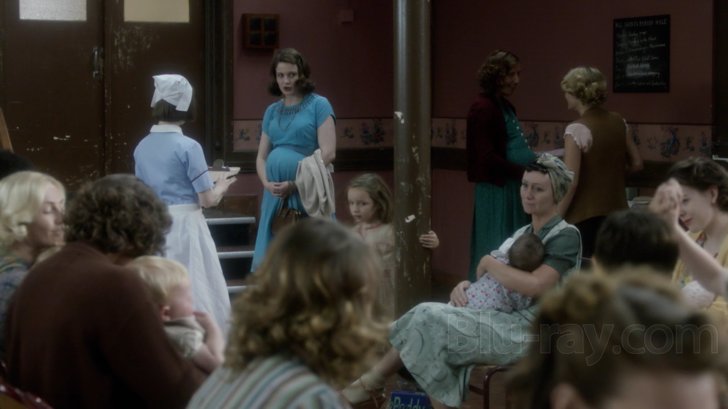
Call the Midwife was shot digitally. It seems to be the practice with any British TV effort that's been digitally originated to master it for Blu-ray at 1080i. Both the BBC and Acorn Media do this, and it's the case here. Since I try not to look at the technical details until after I've watched the discs, I was not aware of the format while viewing. It was only while freezing the frames for screencaps that the interlaced format became noticeable. What was most striking about Call the Midwife as a viewing experience was how beautifully film-like the image was and how artfully the cinematographer, Chris Seager (currently working on Game of Thrones), suggested a faded, older era without leeching all the color from the image. (According to IMDb, Seager used the Arriflex D-21, which is Arri's digital camera designed for motion picture photography. It accepts 35mm lenses.) Despite the interlaced format, the image on BBC's AVC-encoded discs is detailed and free of artifacts (again, while the image is in motion), with a distinctively pale but varied color scheme, and occasionally vivid colors that stand out in certain scenes when emphasis is needed. Blacks are deep and solid, contrast is just right for bringing out detail without distorting it, and compression errors are nowhere to be seen. If not for the absence of any visible grain structure, this could be an expertly transferred image from film. (Note, however, that the interlacing is visible in freeze frames and screen captures.)
Call the Midwife: Season One Blu-ray Movie, Audio Quality 
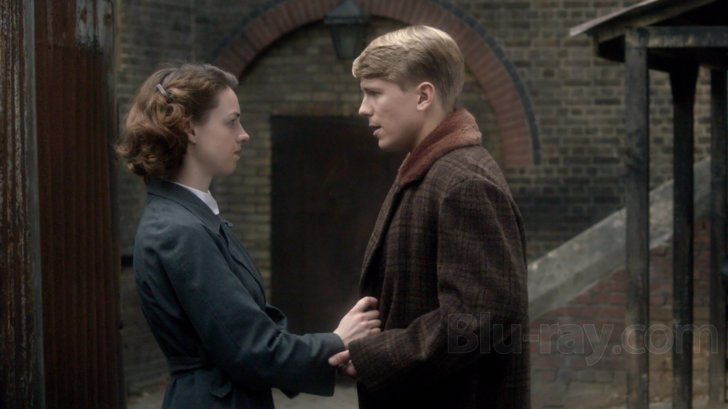
The series' stereo soundtrack is delivered as PCM 2.0, and it's basic and effective. Dialogue is clear, unless you have trouble with the various accents, in which case there are optional subtitles. The charmingly upbeat score by Peter Salem, who has extensive credits in British TV, sets the right tone for a series that is all about remaining cheerful in the face of overwhelming odds.
Call the Midwife: Season One Blu-ray Movie, Special Features and Extras 
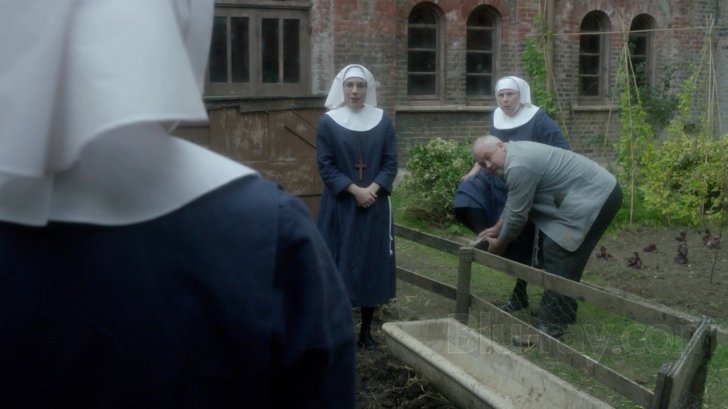
- Wimpoles, Babies and Bicycles (1080i; 1.78:1; 10:02): In this brief but informative featurette, the principal cast members are interviewed about their roles and their participation in the project. Executive producer Pippa Harris also participates. Typical of the tone is Pam Ferris' wry observation that she loves playing a nun, because she doesn't have to spend hours in hair and makeup.
- Trailers: At startup, each of the two discs plays trailers that can be skipped with the chapter forward button and are not available once the disc loads. Disc 1 plays trailers for the new Upstairs, Downstairs, The Hour and BBC America. Disc 2 plays a trailer for Bleak House.
Call the Midwife: Season One Blu-ray Movie, Overall Score and Recommendation 
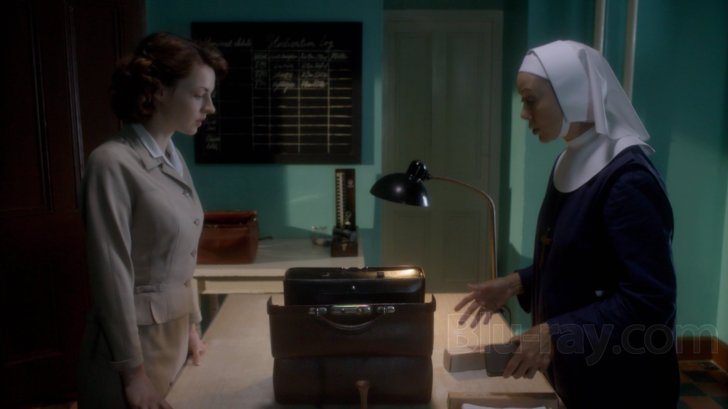
A recurring debate in the theory of history questions whether history is a succession of major dates and momentous events or is rather the accretion of millions, even billions, of small daily actions by individuals that, collectively, constitute humanity moving through time. Call the Midwife suggests a middle path by focusing on daily life during one of its momentous occurrences: the arrival of a new person, filled with as-yet-unrealized possibilities. In one sense, the stories of Jenny and her fellow midwives demystify this process by stripping it of the antiseptic technological wrapping with which modern medical practice has enveloped it and returning it to the basics of home birth (without becoming too graphic). But in another sense, Call the Midwife restores the sense of wonderment that Jenny Worth discovered as a young woman in the East End, as she witnessed people who should have had no hope bringing children into the world and carrying them forward into the future, propelled by little more than stubbornness and love. Highly recommended.
Other editions
Call the Midwife: Other Seasons

Call the Midwife: Season Two
2013

Call the Midwife: Season Three
2014

Call the Midwife: Season Four
2015

Call the Midwife: Season Five
2016

Call the Midwife: Season Six
2017

Call the Midwife: Season Seven
2017
Similar titles
Similar titles you might also like

Won't Back Down
2012

Extraordinary Measures
2010

The Hundred-Foot Journey
2014

One Night with the King
2006

The Help
2011

October Baby
2011

The Ultimate Gift
2006

Runnin' from My Roots
2018

The Secret Garden
1993

Downton Abbey: A New Era
Collector's Edition
2022

Miss Potter
2006

Same Kind of Different as Me
2017

Dolly Parton's Coat of Many Colors
Warner Archive Collection
2015

Anne of Green Gables
30th Anniversary Edition
1985

The Deep End of the Ocean
1999

My Sister's Keeper
2009

Thomas Kinkade's Christmas Cottage
2008

Mr. Holland's Opus
1995

Akeelah and the Bee
2006

War Room
2015